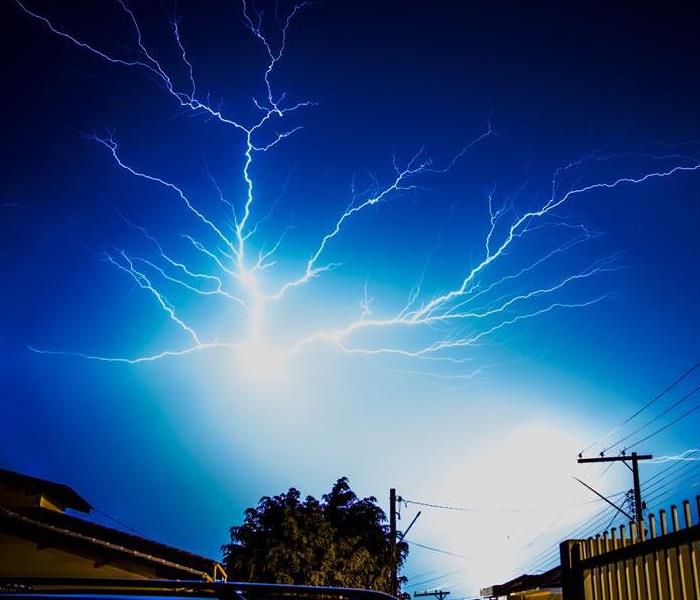The Dangers of Lightning to Your Indiana Home
7/30/2019 (Permalink)
Lightning occurs millions of times each day around the world. From spring through fall, it is also a common occurrence in Indiana. Lightning is a discharge of static electricity between the positively charged particles on the ground and the negatively charged particles in the clouds. As air moves around and moisture builds up, as in a storm, the opposite charges connect forming lightning. It’s kind of like the static shock you sometimes get while wearing socks on a carpeted surface and touching a metal doorknob, only on a bigger scale.
When lightning connects with the ground, it tends to take the shortest and most attractive path. It tends to connect with conductive materials like a metal antenna on a tall building, a power line, a cell tower, a gutter on the house, a telephone line running to the house, or the metal framing around a window or door. Once the lightning connects with a conductive material, like a TV antenna on the roof of a house, it then travels down through conductive materials until it reaches the ground. These conductive materials could be the electrical wiring in your house, the copper water pipes in your walls, or the TV and internet cables running through your house.
The danger in lightning is two-fold. The first is the high voltage of the lightning. Lightning can easily injure or kill someone if it comes into contact with them. Being struck by lightning is more of a risk when someone is outdoors but can also happen inside if the person is talking on a land phone line or standing in a metal door frame or touching a metal faucet when the lightning strikes. This voltage can also destroy most appliances if the lightning travels through them.
The other big danger of lightning is the amount of heat that it produces. The heat that lightning generates is around 36,000 degrees Fahrenheit. It is this heat that results in house fires from lightning strikes. The heat can easily spark a fire as the lightning travels through or makes contact with flammable materials like wooden framing, insulation, electronics, and gas piping. With gas piping, the lightning can damage a valve which can cause a gas leak which can lead to an explosion.
The power surge and the heat from the lightning can also cause the wiring and connected devices in your home to explode and spark fires. The wiring itself can overheat and melt the protective sleeve causing fires within the walls, in your attic, and other hidden areas.
There is one more big danger of lightning that most people don’t think about. That is shock wave damages. While you may not be familiar with shock waves from lightning, you may know it as a different name - thunder. When lightning strikes, it creates a shockwave or thunder that you can hear from miles away. When lightning strikes nearby, you can sometimes feel the shock waves in the air and through the ground. If you can feel the thunder that far away, imagine what thunder can do to a home from a direct hit? Thunder or shock waves from the lightning can be violent enough that they can shake a brick chimney into a pile of rubble. Lightning can crack cinder blocks, bricks, and foundations on a home. The shockwaves from lightning can blow out windows in a home, which is one of the reasons why you should stay away from windows during a lightning storm.
How to Stay Safe from Lightning in Your Home
When lightning is occurring, you want to stay inside your home until the storm has passed. You also want to stay away from windows as they could carry the lightning as it travels to the ground and/or they could also explode or shatter from the shockwaves. Since lightning seeks conductive materials, you want to avoid touching any electronic devices that are plugged in. You also want to avoid washing your hands, doing laundry, or taking a shower or bath, as lightning can travel through the water pipes and hit you. If you are in a basement with a concrete floor, you will want to wear shoes as the concrete can conduct electricity if it has moisture in it. You can use your cellphone or wireless devices (remote control, wireless telephone, laptop) as long as they aren’t connected to any power source or other powered devices.
What If Lightning Strikes Your Indianapolis Home?
If lightning should strike your home, you will want to do a thorough check of your house. Don’t go outside if the lightning storm has not passed. You can, however, check all the rooms for fire or the smell of smoke. You also want to check your garage and attic if possible. The next step is to call the fire department. Even if you did not spot any fires, a small fire could be smoldering inside your walls or attic, and you won’t know until hours later when it has spread. The fire department will be able to do a more thorough check of your property.
If your home has been damaged by lightning, either as a result of fire or shockwaves, you will want to call the storm restoration experts at SERVPRO of Indianapolis West. They have the tools, equipment, and expertise to handle all types of damage from storms. Whether it is water damage, fire damage, or structural damage from lightning; they can help clean up the damage and get your home back to normal. Give them a call for all of your water, mold, fire, and storm damage.






 24/7 Emergency Service
24/7 Emergency Service
